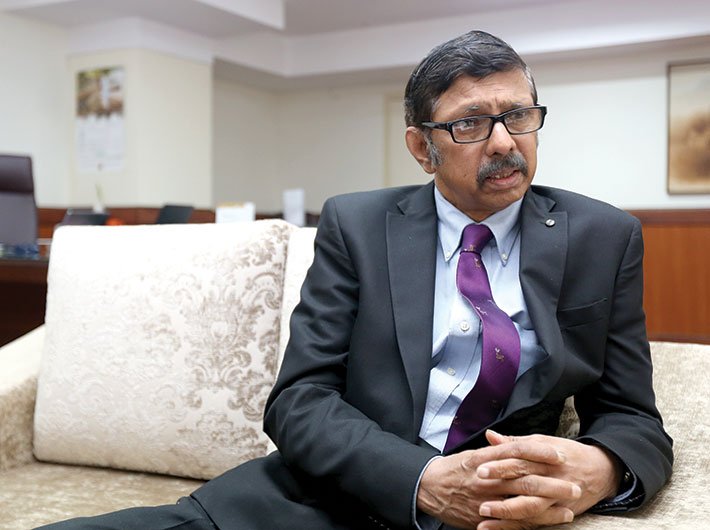As the new chairman of Prasar Bharati, A Surya Prakash has a lot on his mind. From the '13,556 crore losses in 2011-12 to stiff competition from private channels, the organisation is struggling to find its feet. In a freewheeling interview with Ankita Lahiri, he clears the air on some of these issues and discusses his plans to revamp Prasar Bharati. Excerpts:
You have taken over Prasar Bharati at a time when it’s struggling. What direction do you propose to give it?
Let’s get some fundamentals in place. First, until the Prasar Bharati Act was passed by parliament and notified in 1997, Doordarshan (DD) and All India Radio (AIR) were virtually departments of the government. The Act said an autonomous corporation be set up under which DD and AIR were put. Second, it said that you shall uphold the greatest values and promote them. So that is the remit for Prasar Bharati.
Then we come to reality. Out of our (Prasar Bharati’s) annual budget, 50 percent comes in the form of budgetary support from the union government. So if you ask ‘are you an autonomous corporation’, I say we are on the road to [becoming an] autonomous corporation.
Since they (DD and AIR) were government departments for a long time, 90-95 percent of Prasar Bharati employees are central government employees.
Also, the Act said there should be a Prasar Bharati recruitment board. That means we should recruit our own people. And when we do that, the dependence on central government employees will start receding. That has not happened yet. So, this [setting up the recruitment board] is one of my priorities. We are one of the biggest media corporations. This has to be understood both outside and inside Prasar Bharati.
But you are also answerable to parliament. Is it not contradictory?
We have budgetary support from the union government – which has given '2,000 crore this year – so, parliament will ask ‘how did you spend that money’. So, Prasar Bharati will have to stand on its own feet. When does this happen? One, when we have our own recruitment board.
Two, we must monetise our assets. They had to be transferred to Prasar Bharati when the Act came into being. That has not happened.
Then, internal revenue generation – about '1,900 crore this year – has to be sufficient to take care of our annual spending. That, however, does not mean that there is something terribly wrong in taking money from the government because we are a public service broadcaster. Our responsibility is to inform, educate and entertain, in that order. For other channels, the whole focus is on entertainment, even in news. We cannot be like that.
The PM has a reputation of controlling information flow. Does Prasar Bharati run the risk of becoming the government’s mouthpiece?
I have no such fear. We cannot be anything outside the Prasar Bharati Act, nor is there any such attempt by the government. There are certain laws in our country which signify the deepening of our democratic traditions. The first was the Prasar Bharati Act, next came the Right to Information (RTI) Act. Can anyone repeal the RTI Act? It is not possible.
So, you do not fear any interference from the government.
There is no question of anybody in Prasar Bharati being afraid of the government. For what? We have our jobs, our responsibilities [are] cut out. Many people ask ‘do we need a public service broadcaster for a country like India’. I say, of course, we do need one where there are 300-400 million illiterate people. Take the Swach Bharat campaign. AIR and DD are doing a fabulous job. You must listen to the little ads that come on the radio and DD, especially in local languages. In India, 70 percent homes do not have a toilet. Now you have to hammer that idea in [the minds of] 1,300 million people. Who can do it? Prasar Bharati has an important role there. I do not look at it as a government programme. It is a national programme.
British public service broadcaster BBC is seen as a benchmark for TV journalism. DD News used to be one. It no longer is. Questions have been raised about its credibility.
DD news is far more credible than many news channels that we have today. If you want news, please come to DD News. If you want to watch some maara-maari among six or eight people, go to some other channel. Have you seen this kind of maara-maari on BBC? This is the absurdity that I have not seen anywhere else. In the prime-time band watch BBC at 9 pm, there is a specific run order. In that half hour, you will get the picture of global news. Such is the case with DD News. Private channels are getting at each other’s throat on some or the other issue. There is no news there. Actually many of them should be in entertainment genre.
In the next two-three months, I would like to see DD News as a top class news channel.
But why is it not considered a bench-mark for TV journalism in India?
It will be, I am saying. Watch DD News today. There is a byte and then there is a counter-byte. This is the grammar of TV news. So if you say this is sarkari news, I will just laugh at it. If it was sarkari, would you get the byte of the opposition?
Until now, AIR had the monopoly of broadcasting news. Now there is talk of FM channels being able to do the same. Will it change AIR’s position?
It won’t. First of all, what is being discussed is FM channels being permitted to take AIR news. Second, if they were to permit it, FM channels should carry AIR news, because those who hear FM channels should have access to it.
What other initiatives are you planning?
There are a couple of things I want to tell you. We are in the process of ‘FMisation’ in all the metros, as short wave has become unpopular because of technological developments.
Second point is that in India out of 250 million internet connections, 185 million are riding on smartphones. So people are listening to radio on their smartphones. That is the trend now. In four-five years, I expect this number to go up to 500 million. And these people will have internet connections on their smartphones. That is why all of us in media have to go back to the drawing board. We have to create content for this new-age consumer. And that is what Prasar Bharati is trying to do. Our news clips will have to be tailored to a '3,000 jugaad – a cellphone on which we listen to FM and surf internet. And this is not even 3G. When we produce content, we have to keep that in mind. This is low-cost operation for 500 million Indians. They have a device but that device is not so strong and not so smart as to capture our half an hour video.
DD has a monopoly over the white space spectrum. Yet, it is under-utilised. Are you planning to use it?
We have a lot of expansion plans. So the space that is available, we are very conscious of the need for that space, to retain that space.
Your predecessor Jawhar Sircar spoke about digital terrestrial. Can you elaborate on it?
We have 2,300 towers. We are terrestrial but we need a proper assessment on how many people watch us on terrestrial. And then we have to make policy decisions in order to affect those changes in terms of technology to reach out to the large mass of people.
Second, the process is on to digitise our content and the archives. And
we need to find enough funds to speed it up.
ankita@governancenow.com
(The interview appeared in March 1-15, 2015, issue)

